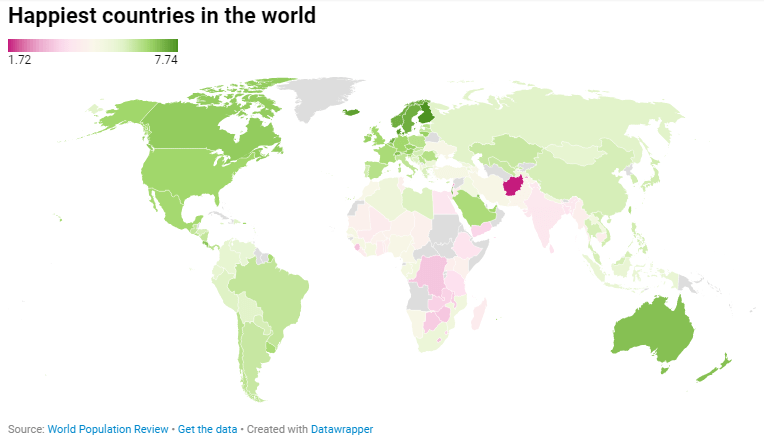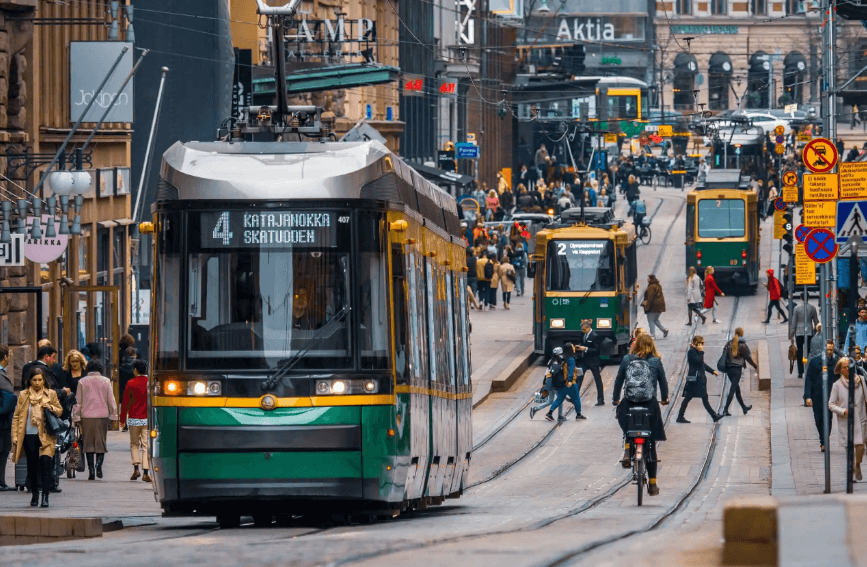Happiness is elusive—perhaps impossible—to measure, but that doesn’t stop researchers from giving it a try. Annual World Happiness Report attempts to do just that, pouring over massive amounts of worldwide polling data.
And for the 10th consecutive year, the result is the same: Finland is the happiest country in the world.
But the 2025 rankings have some interesting—and sobering—lessons. The Nordic countries still hold the top of the rankings, and the United States plummeted to a record low.
So, what is driving happiness globally, and why are certain countries having trouble keeping their citizens happy?

Let’s dig in a bit deeper
Why Public Trust Matters More Than Sunshine
Yes, pleasant scenery and favorable weather do help—but they don’t make a happy country on their own. Year after year, Nordic countries like Finland, Denmark, Norway, Iceland, and Sweden outscore much wealthier or sunnier nations. They topped the world rankings again in 2025, with Finland in the number one slot, followed by its Nordic neighbors.
So what is the secret? Trust in government and strong institutions
Research shows the direct relationship between happiness and whether or not people trust the government and citizens. Where governments are open, there is minimal corruption, and high social trust consistently rank top in happiness measures.
Citizens of Finland consistently report feeling looked after by their community and trusting the public institutions—a whole lot more than GDP.
At the lower end of the list, we have a quite different picture. Afghanistan, with its political instability, poverty, and oppression, remains the world’s unhappiest country, with a score of just 1.721. Lebanon, Lesotho, Sierra Leone, and the Democratic Republic of Congo are also at the bottom, where life is one of adversity and uncertainty.
In many of them, corruption, conflict, and financial collapse have ruined faith in government institutions—one of the leading culprits driving down happiness ratings.
The US Is Falling—and Here’s Why
Most compelling is the continuing decline of the United States, which ranked 24th, its worst mark since the report began. In 2012, during President Obama’s first term, the U.S. ranked 11th. Why is this different?
One of the main drivers: record-low levels of institutional trust. High GDP per capita Americans are reporting mounting levels of political polarization, social polarization, and inequality—none of which foretell national felicity.
Fairness Is, But Wealth Isn’t, Happiness
The World Happiness Report utilizes a mix of six primary variables to rank countries:
- GDP per capita
- Social support
- Healthy life expectancy
- Freedom to make life choices
- Generosity
Perceptions of corruption
To put this information in context, researchers compare every country to an imaginary “Dystopia” — a country with the lowest score in each category. The higher above that baseline a real nation scores, the higher its happiness score.
In a twist of events, even the happiest countries are showing slight decreases. Finland’s score fell from 7.804 to 7.74, and Israel, a top 10 country, fell more sharply amidst rising conflict and tensions.
But one overarching theme still persists: inequality is a leading happiness killer.
Yes, cash is king—particularly when subsistence needs are not met. But beyond that threshold, what is more important is the equity with which wealth is distributed.
Nations such as the U.S. and U.K., with their vast economies, fall below Sweden or the Netherlands, whose more progressive taxation and welfare systems reduce the gap between rich and poor.
Bhutan: The Happiness Pioneering Nation We Can’t Measure
No discussion of happiness would be complete without Bhutan. In the 1970s, the country’s king famously declared that “Gross National Happiness is more important than Gross Domestic Product.” Since then, Bhutan has crafted its policies with wellbeing and awareness at their core, rather than economic production.
Sadly, Bhutan is not included in the World Happiness Report since Gallup does not conduct surveys there. But if it were, its own approach to development might overshadow even Finland.
Takeaway: What Makes a Nation Truly Happy?
The 2025 World Happiness Report leaves little room for doubt that what makes a nation truly happy are robust communities, trustworthy institutions, and a sense of fairness rather than mere wealth.
As disparities increase and faith in government declines in much of the globe, happiness indices are falling even in historically high-placing nations. If policymakers need to increase national well-being, the solution isn’t merely economic expansion—it’s connection, transparency, and equity.
Perhaps happiness can’t be quantified with absolute precision—but it can certainly be better explained.







Leave a Reply